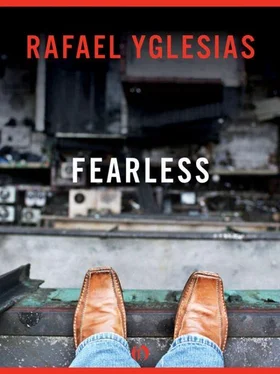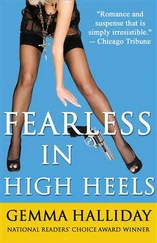Carla was surprised by Max’s wife. She was slight and nervous, not commanding as Carla imagined she would be, and although Debby looked to be around forty years old, she had the uncertain expression of a timid girl.
“I’m sorry,” were Debby’s first words as she climbed the last few steps.
“That’s okay.”
“If I’m interrupting something—”
“That’s okay,” Carla said again.
Debby offered her hand. “I’m Debby.”
“Hi, I’m Carla.” Carla shook it. “Come in. How’s Max doing?”
Debby passed her and entered the apartment with open interest in the objects. She peered at the furniture and the photographs as they moved into the living room. “I guess physically he’s getting better. I’m worried about what’s going on in his head.”
Carla nodded. She gestured for Debby to sit and asked, “Do you want something? Coffee?”
“No. Thanks. I’m sorry to bother you. I guess this is crazy. I’ve never done anything like this in my life.” She laughed and it was a surprise. Her laugh was deep and mature and confident. “When have I ever been in a situation like this? I don’t even know what my situation is—” Her amusement shut off, as suddenly and completely as a light going out. “There are no rules about what’s happened to you and Max. I guess that’s what I realized last night. What a terrible night.” Debby looked into the distance and there was grief in her eyes, the sort of hopelessness that Carla understood very well. “It was the worst night of my life. I thought there would never be anything as bad as the night I thought Max had died—” she found Carla’s sympathetic eyes and stopped. She smiled feebly. “Did Max help you? I talked to Bill Perlman yesterday. He said Max helped you.”
Carla waited to think how she could say it. She felt she owed Debby the truth, if she could figure out what the truth was. She considered and then had an answer that was right. “He saved my soul,” she told Debby.
Debby’s eyes filled with tears. Her lips trembled. “Well,” she stood up, so agitated that she obviously wanted to hide. “Well, then, that’s that. Thank you. I’m going to go.” She turned away. Carla stood up. She hadn’t wanted to make her feel bad and yet she seemed to have hurt her. It was confusing.
Debby moved toward the door. Carla hurried after her. She wanted to say more but she didn’t know what else to say; she had an impulse to take care of Debby, she seemed so fragile. Debby was still upset, only barely managing to contain her tears. She pulled at the front door but couldn’t get it open. “I’m sorry,” she mumbled.
“It’s okay,” Carla said, unlocking it.
Debby opened the door. Her eyes were awash with tears. “I think,” she said to Carla and swallowed hard. “I think maybe you’re the only one who can help Max.” And she rushed out, hurrying down the stairs.
It was sometime later that Carla found herself sitting in the kitchen eating from a box of crackers. She had been thinking so hard it was like a trance: What did Debby mean? How could she help Max? Was there anything wrong with him? To her it seemed that he was as great as anyone could be, that he was fearless and kind and smart and loving. Why would anyone want to change that? She didn’t know, except that obviously he wasn’t being a good husband to Debby. She seemed lost, grief-stricken. Was it Carla’s fault, somehow? Had she done this to them? That was an awful thought, a sin she couldn’t bear. The crackers were so dry she had to go to the sink and drink two glasses of water. As she put the box away the phone rang.
It was Max, speaking in a whisper, “Carla. I’m at my apartment.”
“They let you go—”
“Yes!” he hissed in his hurry to tell her. “Listen. I can’t talk long. Can you meet me somewhere? Or do I have to go down to you?”
“Are you supposed to be—?”
“Carla, I don’t have much time!” He almost moaned. “Brillstein and my wife — they’re going to put me in a mental institution. I have to get away. Can you meet me somewhere?”
“No!” she said, shocked.
“You can’t?”
“No, I mean, they’re not going to put you away.”
“I can’t talk. Listen, I don’t know where…Grand Central. Do you know the Oyster Bar Restaurant?”
“No.”
“It’s underneath Grand Central. Take the Lex. That’s near you, isn’t it? Or a cab. I’ll pay you back. Go into Grand Central and look for the signs. The Oyster Bar Restaurant. Meet me there at noon. Don’t go in. At the entrance. Okay? Please?”
“Sure, Max.”
He hung up. He had sounded crazy. She was sad for a moment and didn’t want to move. She was reluctant to go out, blocks away from home, into the underground with beggars and crazies, to the middle of Manhattan filled with people, thousands and thousands, all indifferent, all strange.
It passed quickly. She had wished for something to do. Max needed her. Wasn’t that better than a job? If he was really crazy then she owed him her help all the more.
The trip uptown was scary. Everyone in New York seemed demented in one way or another. Many were openly so: in rags, shouting at invisible tormentors, thrusting paper cups and insisting on money as if you owed them charity. Many more were fearful, pretending to be self-absorbed while they peeked from behind newspapers, wearing earphones that disappeared into their clothing or shoulder bags, as if they were switchboard operators wandering sadly to find something they could plug into. The teenagers were scary, especially the black teenagers, whose eyes were so angry and so hopeless that she couldn’t believe there was any mercy in their hearts. She avoided meeting their defiant stares.
“Don’t look at him,” Manny had once whispered to her because she looked closely at a man on the subway whose pants were gray with filth, who had a cut across his forehead, and whose left shoe top had come off. “When you’re really poor you don’t want people to look at you,” he explained later. “All they got is their pride. You were shaming him. He could kill you for that.”
“Oh, come on, Manny!” She had laughed, nervous at the idea.
“Don’t laugh.” Manny had been grave. He pointed to the sky to emphasize the importance of what he was saying. “I know what I’m talking about. I was one of them in Manila. I didn’t care the Americans were so rich so long as they didn’t look at me like I was an animal in the zoo.”
She got to Grand Central without incident. The station seemed to be in another time. The curved interior walls were made of smooth gray stone as thick as a tomb’s. The clocks were old-fashioned and so was the lettering embedded in the walls that directed people to the trains or the exits. Carla thought it was too gloomy.
Max probably thinks it looks beautiful, she realized and felt better about this meeting. Grand Central was Max’s kind of place. At least he was still partly himself.
She found the Oyster Bar easily. It was also preserved from New York’s past. She liked it better. The arched entrance walls were cunningly made with once white tiles that now had a yellow tint. One half of the restaurant had snaking U-shaped counters to accommodate quick lunches; the other half had tables with red-checked cloths. It reminded her of her hardworking father.
She stood outside in the station’s tombs, soothed by the echo of footsteps. She saw Max from a long way off coming toward her. Behind him a cloud of dusty light from the street darkened his face. He walked like an old man.
She hurried to help him.
“Hello, Carla,” he said as she reached him and put her arm through his. He smiled at her anxious grip. “I’m okay. I’m just getting used to walking distances. I guess I don’t trust that my head is better.”
Читать дальше












